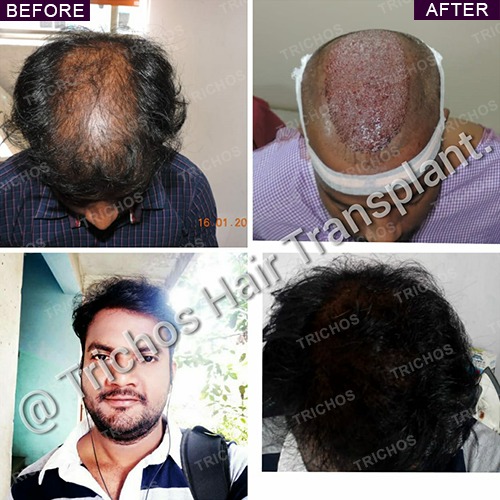Why Minoxidil & Finasteride Advised Post Hair Transplant
Why does a hair transplant surgeon often prescribe Minoxidil & Finasteride (both generic names) medication to a patient immediately after a hair transplant procedure? Will the transplanted hair fail if these medications are avoided? Won’t the transplanted hair grow properly without them?
The above are common questions that Dr John Watts – noted dermatologist, trichologist and one of the Best Hair Transplant Surgeons in Hyderabad – have often encountered from his patients.
With over 1900+ successful hair and beard hair transplant surgeries performed, Dr John Watts brings this awareness-cum- educational video series to enlighten laymen and those curious about commonly observed hair loss, baldness, pre and post hair transplant issues.
“The transplanted hair will not fail or face problems if Minoxidil & Finasteride are not taken but the same is not true in case of non-transplanted hair,” explains Dr John Watts.
Explaining it further, he adds, "We need to understand that Minoxidil & Finasteride medications have nothing to do with transplanted hair but they are still prescribed as they are needed to help ensure the growth of existing hair (non-transplanted)"
Native Hair Growth:
The native hair is defined as existing hair or non-transplanted hair i.e those which are untouched during the hair transplant procedure. For instance, a transplant surgery may be performed from donor hair obtained from the back of the scalp and transplanted on the front of the scalp.
In such a scenario, the top hair remains untouched and it may be called the native hair, which may need Minoxidil & Finasteride to help keep them in growing condition.
“In many hair transplant cases, there runs a strong genetic disposition of baldness in the family of the patient. Sooner or later, say 1, 2 or 3 years, they are likely to face baldness issues even after a transplant. Hence, the existing non transplanted native hair is protected with the use of Minoxidil & Finasteride,” explains Dr John Watts.
Explaining its seriousness, Dr John Watts says that if existing non transplanted hair is lost to baldness without taking any steps to protect them, patients may have to go for the second round of hair transplant surgery.
“The problem becomes acute if there is no donor hair left. In such a scenario, the only alternative left is to go for hair patch or bio fibre – artificial hair,” he adds.
How Minoxidil & Finasteride Help
Minoxidil is known to aid in prolonging the anagen or growth phase of the hair. It also helps in ensuring blood circulation to the scalp and makes existing hair stronger. Similarly, finasteride is known to act as a DHT blocker and prevent hair loss.
Finasteride Side-Effects
In the educational video, Dr John Watts acknowledges the fact that Finasteride may act differently for different people with side effects known to be observed in about 2% of the patients who use it.
“If it shows side effects, stop using it. But choices get limited if one completely avoids it without even trying out of fear,” says Dr John Watts, while reiterating that under no circumstances these two drugs should never be self-medicated or taken without expert supervision or prescription.
The viewers are advised to leave their comments/feedback/questions for Dr John Watts below the video. In his concluding note, the noted hair transplant surgeon in Hyderabad also urges viewers to share the video among their friends for awareness of the issue.
Trichos brings you the best hair experts in Hyderabad, offering a range of hair loss and transplant solutions. Call us today!
Book an appointment for expert guidance


About
Causes
Alopecia
Restoration
Procedures
Locations
Disclaimer: While hair transplants are generally safe and effective, as with any medical procedure, there can be minimal and temporary side effects based on specific or underlying medical condition of the individual patient. Please consult in person with our qualified medical team at Trichos for a thorough assessment of your specific condition and individualized guidance on the potential risks and benefits associated with our hair restoration treatments.
Learn more about Medical Consent for Surgeries.



